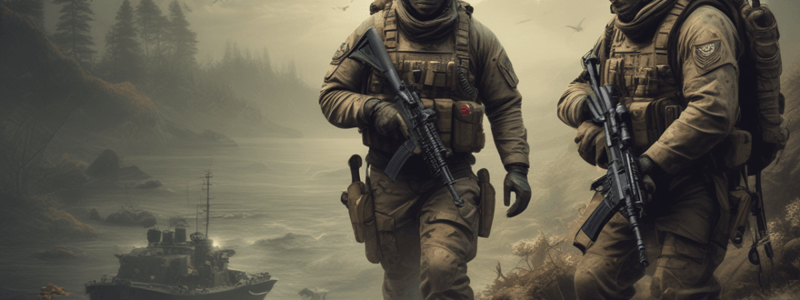Podcast
Questions and Answers
In what year was the SAS formed?
In what year was the SAS formed?
- 1942 (correct)
- 1940 (correct)
- 1943
- 1941
Who led the initial group of 60 volunteers in the SAS?
Who led the initial group of 60 volunteers in the SAS?
- General Montgomery (correct)
- Lieutenant David Stirling (correct)
- King George VI
- Winston Churchill (correct)
What type of warfare is NOT part of the SAS training?
What type of warfare is NOT part of the SAS training?
- Jungle warfare (correct)
- Mountain warfare (correct)
- Naval warfare (correct)
- Desert warfare
What is NOT an operation type conducted by the SAS?
What is NOT an operation type conducted by the SAS?
How many squadrons does the SAS comprise?
How many squadrons does the SAS comprise?
What type of vehicle is NOT used by the SAS?
What type of vehicle is NOT used by the SAS?
What was the name of the operation where the SAS rescued British soldiers and civilians from a Sierra Leonean militia?
What was the name of the operation where the SAS rescued British soldiers and civilians from a Sierra Leonean militia?
What was the name of the operation where the SAS participated in the invasion of Iraq?
What was the name of the operation where the SAS participated in the invasion of Iraq?
Flashcards are hidden until you start studying
Study Notes
Overview
The SAS (Special Air Service) is a special forces unit of the British Army, established in 1941.
History
- Formed during World War II to conduct reconnaissance and sabotage missions behind enemy lines
- Initially composed of 60 volunteers, led by Lieutenant David Stirling
- Successfully completed numerous operations in North Africa, Italy, and France
Selection and Training
- Candidates undergo rigorous selection process, known as "Selection"
- Training includes:
- Jungle warfare
- Desert warfare
- Mountain warfare
- Arctic warfare
- Unarmed combat
- Marksmanship
- Language skills
- Survival skills
Operations
- Conducts various types of operations, including:
- Counter-terrorism
- Direct action
- Special reconnaissance
- Unconventional warfare
- Hostage rescue
- Counter-insurgency
- Operates in small, agile teams, often behind enemy lines
- Utilizes advanced skills, such as languages, surveillance, and sabotage
Organisation
- Part of the UK Special Forces (UKSF) umbrella
- Comprises three squadrons:
- 21 SAS Regiment (Artists Rifles)
- 22 SAS Regiment
- 23 SAS Regiment
- Each squadron has its own specialisation and operational focus
Equipment and Vehicles
- Utilizes cutting-edge equipment, including:
- Firearms (e.g. Glock 19, HK G36)
- Explosives and demolition gear
- Communication devices
- Surveillance technology
- Operates various vehicles, including:
- Land Rovers
- Jackals
- Pinzgauers
- Helicopters (e.g. Apache, Chinook)
Notable Operations
- Operation Flavius (1988): Successfully neutralized an IRA bombing attempt in Gibraltar
- Operation Barras (2000): Rescued British soldiers and civilians from a Sierra Leonean militia
- Operation Telic (2003): Participated in the invasion of Iraq
- Operation Shader (2014): Conducted operations against ISIS in Iraq and Syria
Overview
- The SAS is a special forces unit of the British Army, established in 1941.
History
- Formed during World War II for reconnaissance and sabotage missions behind enemy lines.
- Initially composed of 60 volunteers, led by Lieutenant David Stirling.
- Successfully completed numerous operations in North Africa, Italy, and France.
Selection and Training
- Candidates undergo rigorous selection process, known as "Selection".
- Training includes jungle, desert, mountain, and Arctic warfare, as well as unarmed combat, marksmanship, language skills, and survival skills.
Operations
- Conducts counter-terrorism, direct action, special reconnaissance, unconventional warfare, hostage rescue, and counter-insurgency operations.
- Operates in small, agile teams, often behind enemy lines, utilizing advanced skills, such as languages, surveillance, and sabotage.
Organisation
- Part of the UK Special Forces (UKSF) umbrella.
- Comprises three squadrons: 21 SAS Regiment (Artists Rifles), 22 SAS Regiment, and 23 SAS Regiment, each with its own specialisation and operational focus.
Equipment and Vehicles
- Utilizes cutting-edge equipment, including firearms (e.g. Glock 19, HK G36), explosives and demolition gear, communication devices, and surveillance technology.
- Operates various vehicles, including Land Rovers, Jackals, Pinzgauers, and helicopters (e.g. Apache, Chinook).
Notable Operations
- Operation Flavius (1988): Neutralized an IRA bombing attempt in Gibraltar.
- Operation Barras (2000): Rescued British soldiers and civilians from a Sierra Leonean militia.
- Operation Telic (2003): Participated in the invasion of Iraq.
- Operation Shader (2014): Conducted operations against ISIS in Iraq and Syria.
Studying That Suits You
Use AI to generate personalized quizzes and flashcards to suit your learning preferences.




